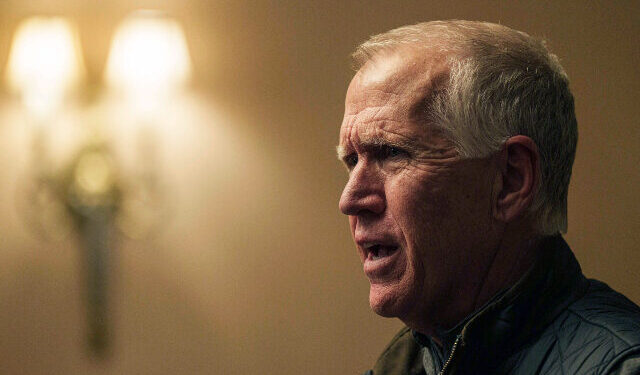In a Saturday night stunner, Sen. Thom Tillis (R-NC) announced he will vote against advancing President Trump’s “One Big Beautiful Bill,” citing concerns over potential Medicaid funding cuts to North Carolina. His stance places him squarely at odds with conservative leadership—and may signal deeper tensions within the GOP over what the future of healthcare, spending, and Trump’s second-term agenda should look like.
While Tillis framed his opposition as standing up for rural hospitals, others in the conservative movement are asking tougher questions: Is this truly about North Carolina’s needs—or about protecting establishment interests?
In a statement posted to X, Tillis wrote:
“I did my homework on behalf of North Carolinians, and I cannot support this bill in its current form. It would result in tens of billions of dollars in lost funding for North Carolina, including our hospitals and rural communities.”
He claimed the bill would force “painful decisions” such as rolling back Medicaid expansion or cutting services to existing enrollees. While acknowledging the bill’s strong border security, Trump Tax Cuts extension, expanded child tax credit, and crackdown on wasteful spending, Tillis said he couldn’t vote yes without protecting Medicaid access.
But conservative watchdogs aren’t buying it.
As Tillis publicly warns of damage to North Carolina, critics are highlighting a different provision he quietly added to the bill—one that’s drawn sharp pushback from conservatives and consumer advocates alike.
The clause would tax profits earned by third-party litigation financiers, a move critics say undermines everyday Americans and protects powerful corporate interests.
Will Hild, Executive Director of Consumers’ Research, blasted the measure, saying:
“This provision is needlessly broad and undermines one of the few tools the average American consumer has to fight back against corporate political activists.”
A mobile billboard condemning Tillis as siding with the Chamber of Commerce over consumers was spotted circling Capitol Hill Thursday. For many grassroots conservatives, it was a telling symbol: a GOP senator claiming to defend rural folks while helping deep-pocketed elites behind closed doors.
Predictably, Democrats seized on Tillis’s opposition, echoing claims that Trump’s bill would cause a wave of rural hospital closures. But many of their sources raise red flags.
Take the UNC Sheps Center—frequently cited in these critiques. Leadership at the center has promoted radical gender ideology and has long supported Democrat-backed policy. Their Medicaid forecasts? Questionable at best.
One cited study from Manatt Health includes dire projections based in part on the idea that illegal immigrants and able-bodied adults who refuse to work could lose access to Medicaid under the GOP proposal. For many conservatives, that sounds like common-sense reform, not a crisis.
And here’s the kicker: Only 4.9% of Medicaid inpatient hospital spending actually goes to rural hospitals, according to government data. Critics argue the bill would refocus funds where they’re truly needed—by cutting fraud and blocking coverage for those here illegally.
Fueling the chaos is the Senate parliamentarian, who just struck several Medicaid-related provisions from the bill. Among them:
- The provider tax used to help pay for Trump’s extended tax cuts
- Language barring transgender procedures from Medicaid coverage
- A clause blocking benefits for illegal immigrants
These rulings, under obscure reconciliation rules, tie the GOP’s hands on what spending reforms can be included. While unelected, the parliamentarian holds massive sway—a fact that’s frustrated many Republican lawmakers trying to deliver on campaign promises.
Despite Tillis’s grandstanding and Democrat fearmongering, Senate Majority Leader John Thune (R-SD) told Breitbart News Saturday that Republican leadership has backup plans in place:
“We expected many of these challenges and are working to pass a final version that reflects the House’s priorities while advancing Trump’s agenda.”
Thune made clear: this bill is far from dead. With Vice President JD Vance helping navigate negotiations and President Trump pushing hard from the sidelines, the pressure is mounting to unify the GOP and deliver.
At its core, this battle isn’t just about Medicaid math—it’s about the direction of the Republican Party. Will it stay focused on limited government, national sovereignty, and taxpayer-first reforms? Or will it fall back into the corporate-consensus politics that voters rejected in 2016?
Tillis’s opposition, couched in concern for hospitals, conveniently aligns with powerful lobbyists, industry insiders, and liberal academics. Meanwhile, the bill he’s fighting against promises lower taxes, secure borders, and an end to freeloading on American welfare programs.
If conservatives want real reform—not just more empty promises—they’ll need to keep their eyes on the ball…and the Senate floor.
Trump’s “One Big Beautiful Bill” may be bruised, but it’s not beaten. And the fight is far from over.




















